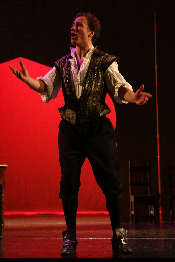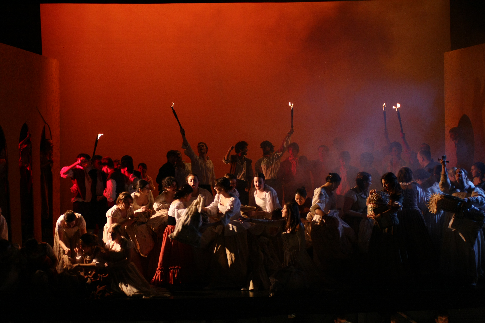
23 Mar 2008
Lalo's Fiesque — University College Opera
UC Opera's reputation for showcasing rare large-scale works has been boosted this year with the UK premiere of this 1846 opera by Edouard Lalo after a Schiller play.
English Touring Opera are delighted to announce a season of lyric monodramas to tour nationally from October to December. The season features music for solo singer and piano by Argento, Britten, Tippett and Shostakovich with a bold and inventive approach to making opera during social distancing.
This tenth of ten Live from London concerts was in fact a recorded live performance from California. It was no less enjoyable for that, and it was also uplifting to learn that this wasn’t in fact the ‘last’ LfL event that we will be able to enjoy, courtesy of VOCES8 and their fellow vocal ensembles (more below …).
Ever since Wigmore Hall announced their superb series of autumn concerts, all streamed live and available free of charge, I’d been looking forward to this song recital by Ian Bostridge and Imogen Cooper.
Although Stile Antico’s programme article for their Live from London recital introduced their selection from the many treasures of the English Renaissance in the context of the theological debates and upheavals of the Tudor and Elizabethan years, their performance was more evocative of private chamber music than of public liturgy.
Evidently, face masks don’t stifle appreciative “Bravo!”s. And, reducing audience numbers doesn’t lower the volume of such acclamations. For, the audience at Wigmore Hall gave soprano Elizabeth Llewellyn and pianist Simon Lepper a greatly deserved warm reception and hearty response following this lunchtime recital of late-Romantic song.
For this week’s Live from London vocal recital we moved from the home of VOCES8, St Anne and St Agnes in the City of London, to Kings Place, where The Sixteen - who have been associate artists at the venue for some time - presented a programme of music and words bound together by the theme of ‘reflection’.
'Such is your divine Disposation that both you excellently understand, and royally entertaine the Exercise of Musicke.’
‘And there was war in heaven: Michael and his angels fought against the dragon; and the dragon fought and his angels, And prevailed not; neither was their place found any more in heaven … that old serpent … Satan, which deceiveth the whole world: he was cast out into the earth, and his angels were cast out with him.’
There was never any doubt that the fifth of the twelve Met Stars Live in Concert broadcasts was going to be a palpably intense and vivid event, as well as a musically stunning and theatrically enervating experience.
‘Love’ was the theme for this Live from London performance by Apollo5. Given the complexity and diversity of that human emotion, and Apollo5’s reputation for versatility and diverse repertoire, ranging from Renaissance choral music to jazz, from contemporary classical works to popular song, it was no surprise that their programme spanned 500 years and several musical styles.
The Academy of St Martin in the Fields have titled their autumn series of eight concerts - which are taking place at 5pm and 7.30pm on two Saturdays each month at their home venue in Trafalgar Square, and being filmed for streaming the following Thursday - ‘re:connect’.
The London Symphony Orchestra opened their Autumn 2020 season with a homage to Oliver Knussen, who died at the age of 66 in July 2018. The programme traced a national musical lineage through the twentieth century, from Britten to Knussen, on to Mark-Anthony Turnage, and entwining the LSO and Rattle too.
With the Live from London digital vocal festival entering the second half of the series, the festival’s host, VOCES8, returned to their home at St Annes and St Agnes in the City of London to present a sequence of ‘Choral Dances’ - vocal music inspired by dance, embracing diverse genres from the Renaissance madrigal to swing jazz.
Just a few unison string wriggles from the opening of Mozart’s overture to Le nozze di Figaro are enough to make any opera-lover perch on the edge of their seat, in excited anticipation of the drama in music to come, so there could be no other curtain-raiser for this Gala Concert at the Royal Opera House, the latest instalment from ‘their House’ to ‘our houses’.
"Before the ending of the day, creator of all things, we pray that, with your accustomed mercy, you may watch over us."
The doors at The Metropolitan Opera will not open to live audiences until 2021 at the earliest, and the likelihood of normal operatic life resuming in cities around the world looks but a distant dream at present. But, while we may not be invited from our homes into the opera house for some time yet, with its free daily screenings of past productions and its pay-per-view Met Stars Live in Concert series, the Met continues to bring opera into our homes.
Music-making at this year’s Grange Festival Opera may have fallen silent in June and July, but the country house and extensive grounds of The Grange provided an ideal setting for a weekend of twelve specially conceived ‘promenade’ performances encompassing music and dance.
There’s a “slide of harmony” and “all the bones leave your body at that moment and you collapse to the floor, it’s so extraordinary.”
“Music for a while, shall all your cares beguile.”
The hum of bees rising from myriad scented blooms; gentle strains of birdsong; the cheerful chatter of picnickers beside a still lake; decorous thwacks of leather on willow; song and music floating through the warm evening air.

UC Opera's reputation for showcasing rare large-scale works has been boosted this year with the UK premiere of this 1846 opera by Edouard Lalo after a Schiller play.
The opera, for political reasons at the time of its composition, was not given its world premiere until last 2006 when it was given in concert in Montpellier, closely followed by its stage premiere in Mannheim in 2007.
Set in 16th-century Genoa, it inhabits the same world as Verdi's Simon Boccanegra, though its dark and threatening atmosphere make it more reminiscent of Un ballo in maschera or La Gioconda. It certainly succeeds in evoking an Italian flavour more effectively than any other mid-19th-century French opera about Italy which comes to mind.
As the performance progressed, I wished I had familiarised myself with the synopsis rather more thoroughly at the outset. It seemed to be a tale of marital jealousy on one hand, and one of political intrigue on the other — with the two threads having little relevance to one another. Somehow I had missed the crucial detail that the wanton Julie, with whom the eponymous hero seems determined to break his marriage vows, is the daughter of the enemy and therefore a pivotal pawn in a political game.
Indeed, the dramatic structure of the piece is flawed; for example, the opening scene belongs to Fiesque's wife Leonore, who is lamenting her husband's apparent abandonment of her, but it's then several scenes before she makes another appearance. There are a lot of characters, and so many plot details that it is very difficult to remember anybody's motivation for their actions. To make matters worse, the plot hinges on Fiesque himself often acting in a seemingly erratic manner, which only adds to the confusion – in fact he's acting for the greater good, but the audience don't get let into the secret any sooner than his family or allies do. There is simply too much going on, too few threads holding it all together, and too much incongruity amongst the motley group of characters.
 The revolution scene
The revolution scene
Emma Rivlin's straightforward production serves it well, however, and UC Opera's amateur forces (making up the chorus, orchestra and comprimario roles) gave the best performance I have heard from them in several years. Under Charles Peebles's direction, there was little in the orchestral playing to remind the audience of the players' amateur status. Similarly the chorus, made up of lots of youthful, amateur voices, may not have a traditionally 'operatic' timbre but produced an impressive sound. The chorus was well-directed, too, especially in the revolution scene towards the end, where the highly-charged atmosphere was palpable and everybody looked involved.
As for the professional principals, the male leads were, for the most part, very strongly cast: Robert Davies was outstanding as Fiesque's political-ally-turned-nemesis, Verrina, and tenor David Curry gave an assured and polished account of the title role. Margaret Cooper's Leonore and Alison Crookendale's Julie both suffered from over-generous vibrato and one-dimensional character portraits (though to be fair, neither role has much to work with in terms of character development.)
Fiesque may not be a lost masterpiece, but UC Opera certainly made as persuasive a case for it as it is ever likely to get.
Click here for this production's program.
Ruth Elleson © 2008